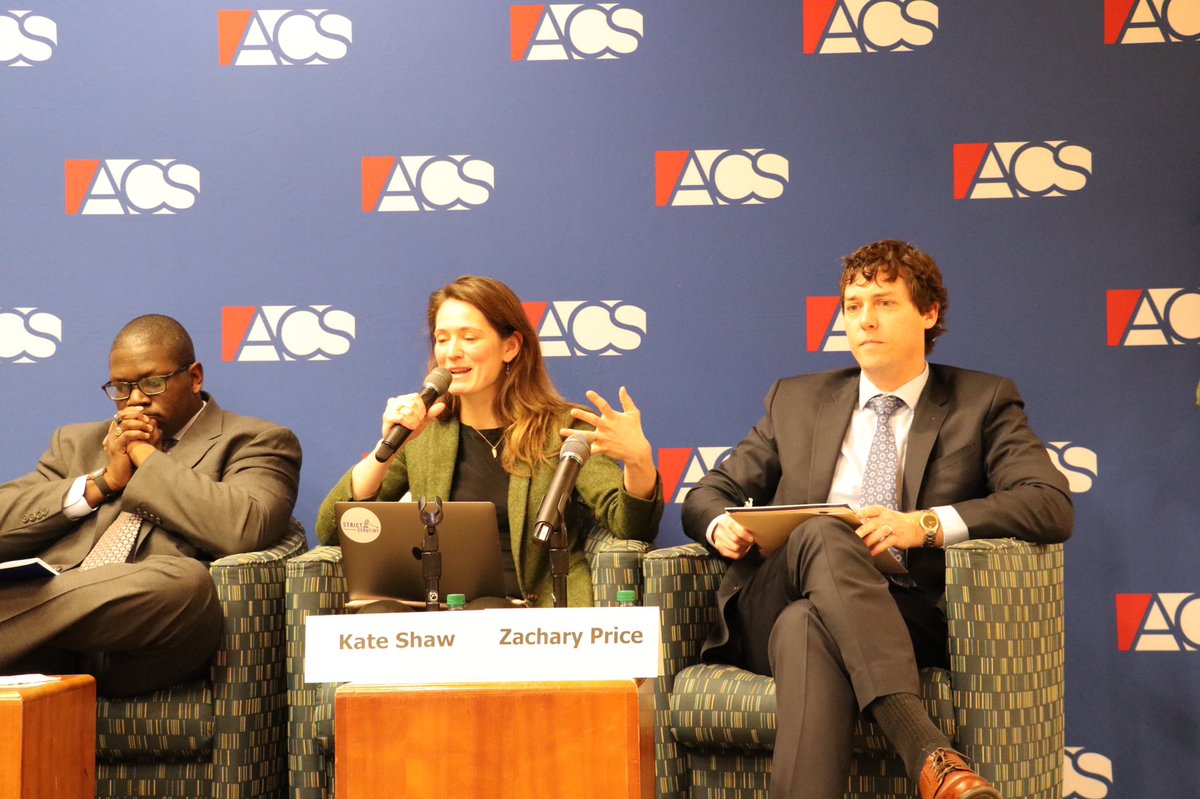About to start our symposium on separation of powers co-hosted by @ACSGeorgetown. First up at 8:30 is @RepRaskin!
Follow along with #ACSLawEvents
Event details: buff.ly/37hO6J7
Follow along with #ACSLawEvents
Event details: buff.ly/37hO6J7

“Has the presidency grown so powerful that it’s thrown our constitutional balance out of whack?” These are the questions we will contemplate today. ACS Interim President Zinelle October opens our symposium. #ACSLawEvents 

We need to reassert the proper powers of Congress, says @RepRaskin: "Because we live in a time of such untrammeled executive power, we need to develop a series of statutory frameworks to deal with this power." #ACSLawEvents 

@RepRaskin In this recent @washingtonpost op-ed @RepRaskin expands on some of the themes from this morning's remarks. #ACSLawEvents washingtonpost.com/outlook/congre…
Now our first panel discussing “The Rise of the Unilateralist Presidency”featuring @KimberlyEAtkins, Hon. Brad Miller, Erica Newland, @vicnourse and Sai Prakash #ACSLawEvents 

@KimberlyEAtkins @vicnourse Related reading! @vicnourse's issue brief for ACS arguing that Morrison v. Olson remains good law and that #SCOTUS has never embraced the radical theory of presidential power known as the “unitary executive” that Justice Scalia’s dissent championed: acslaw.org/issue_brief/br…
@KimberlyEAtkins @vicnourse Hon. Brad Miller: "I don’t think the Framers thought they were doing something for the ages. [Our government] has worked not because the design was so brilliant but because Americans have made it work." #ACSLawEvents 

@KimberlyEAtkins @vicnourse Sai Prakash of @UVALaw argues that when Congress delegates rulemaking authority to the executive branch, it is essentially ceding legislative authority to the president. #ACSLawEvents
@KimberlyEAtkins @vicnourse @UVALaw Erica Newland of @protctdemocracy: Congress should be doing more legislating--nobody is well served by regulations that bounce back and forth every 4 years. #ACSLawEvents 

@KimberlyEAtkins @vicnourse @UVALaw @protctdemocracy Prakash's article "The Chief Prosecutor" elaborates on his view of the president’s constitutional relationship to prosecutions and the role of the attorney general. Link: digital.sandiego.edu/cgi/viewconten…
Discussion begins for next panel: Protector-in-Chief: Cooption of National Security by the Executive Branch. Featuring: @MiekeEoyang, @GeneHealy, @marty_lederman, Bijal Shah of @ASUCollegeOfLaw and @HinaShamsi. #ACSLawEvents 

@MiekeEoyang @GeneHealy @marty_lederman @ASUCollegeOfLaw @HinaShamsi In a positive development last week, notes @HinaShamsi, the House took 2 votes that show an attempt to rein in the president's authority to use military force: One was to revoke the 2002 AUMF. Second was to block funding for military action in Iran. #ACSLawEve
@MiekeEoyang @GeneHealy @marty_lederman @ASUCollegeOfLaw @HinaShamsi .@GeneHealy of @CatoInstitute: If you try to separate signal from noise, a lot of what has happened in Trump presidency is the aggressive use of authorities that his predecessors left to him #ACSLawEvents
@MiekeEoyang @GeneHealy @marty_lederman @ASUCollegeOfLaw @HinaShamsi @CatoInstitute However, notes @GeneHealy, Trump is the first to declare a national emergency to get access to funds that Congress would not appropriate to him. It is quite dangerous and it may not be the last time we see it. #NationalSecurity #ACSLawEvents
@MiekeEoyang @GeneHealy @marty_lederman @ASUCollegeOfLaw @HinaShamsi @CatoInstitute The #publiccharge rule is symbolic of another new thing
@realDonaldTrump is doing, explains Bijal Shaw: This interest in interfering in the lives of noncitizens once they have already been granted status. #ACSLawEvents
@realDonaldTrump is doing, explains Bijal Shaw: This interest in interfering in the lives of noncitizens once they have already been granted status. #ACSLawEvents
@MiekeEoyang @GeneHealy @marty_lederman @ASUCollegeOfLaw @HinaShamsi @CatoInstitute @realDonaldTrump Be careful what you wish for when it comes to Congress restraining the president's use of force without their authority, warns @marty_lederman #ACSLawEvents #NationalSecurity
@MiekeEoyang @GeneHealy @marty_lederman @ASUCollegeOfLaw @HinaShamsi @CatoInstitute @realDonaldTrump We had the nation’s longest govt shutdown b/c Congress refused to provide Trump $ for a xenophobic wall, notes @HinaShamsi. So it’s not that Congress hasn’t been acting but the question is: What happens when the various norms we relied on in previous administrations are thwarted?
“I’m a big fan of ACS,” says #JehJohnson , Former Secretary of Homeland Security, beginning his keynote address . #Acslawevents 

#JehJohnson: A vote to authorize war can be hazardous, and even fatal, to one’s political health. Collectively, members of Congress no longer want to take a hard vote on whether to go to war. #ACSlawevents
The War Powers Resolution should be repealed and replaced, argues #JehJohnson, recommending the War Powers Consultation Act introduced in 2014 which repeals the WPR and puts the onus on Congress to act. #ACSLawEvents #NationalSecurity
Lively Q&A with #JehJohnson regarding his experiences w/the extremely difficult matter of making decisions regarding the use of military force. #ACSLawEvents 

Up now our final panel, Imagining a Resurgent Congress, featuring: @RJLewisGMF, @snlester, Zachary Price, @kateashaw1 and @donaldonethics. #ACSLawEvents #SeparationOfPowers 

On collateral damage from the #ImpeachmentTrial , @kateashaw1 argues the House should have sought expedited review from courts of subpoenas. Worry is that the executive branch will be emboldened 

.@donaldonethics: Congress’s abdication of its oversight responsibility over the years shows the importance of good government groups like @CREWcrew , pointing to CREW’s swift action early on to sue the Trump administration over emoluments clause violations #ACSLawEvents 

Zachary Price: There are structural, institutional dynamics of Congress - the need to build coalitions to govern and partisan interest among them - that create challenges in exerting power that the unitary presidency does not face. #SeparationOfPowers #ACSLawEvents 

.@snlester: There are historical examples of both Congress and the president, in turn, misusing their power over trade. What we need to do is refine the balance between the two branches on trade powers. #SeparationofPowers #ACSLawEvents 

We’re so grateful to our expert speakers and moderators. And to @ACSGeorgetown and @GeorgetownLaw for providing a great space and event support! #ACSLawEvents
• • •
Missing some Tweet in this thread? You can try to
force a refresh




